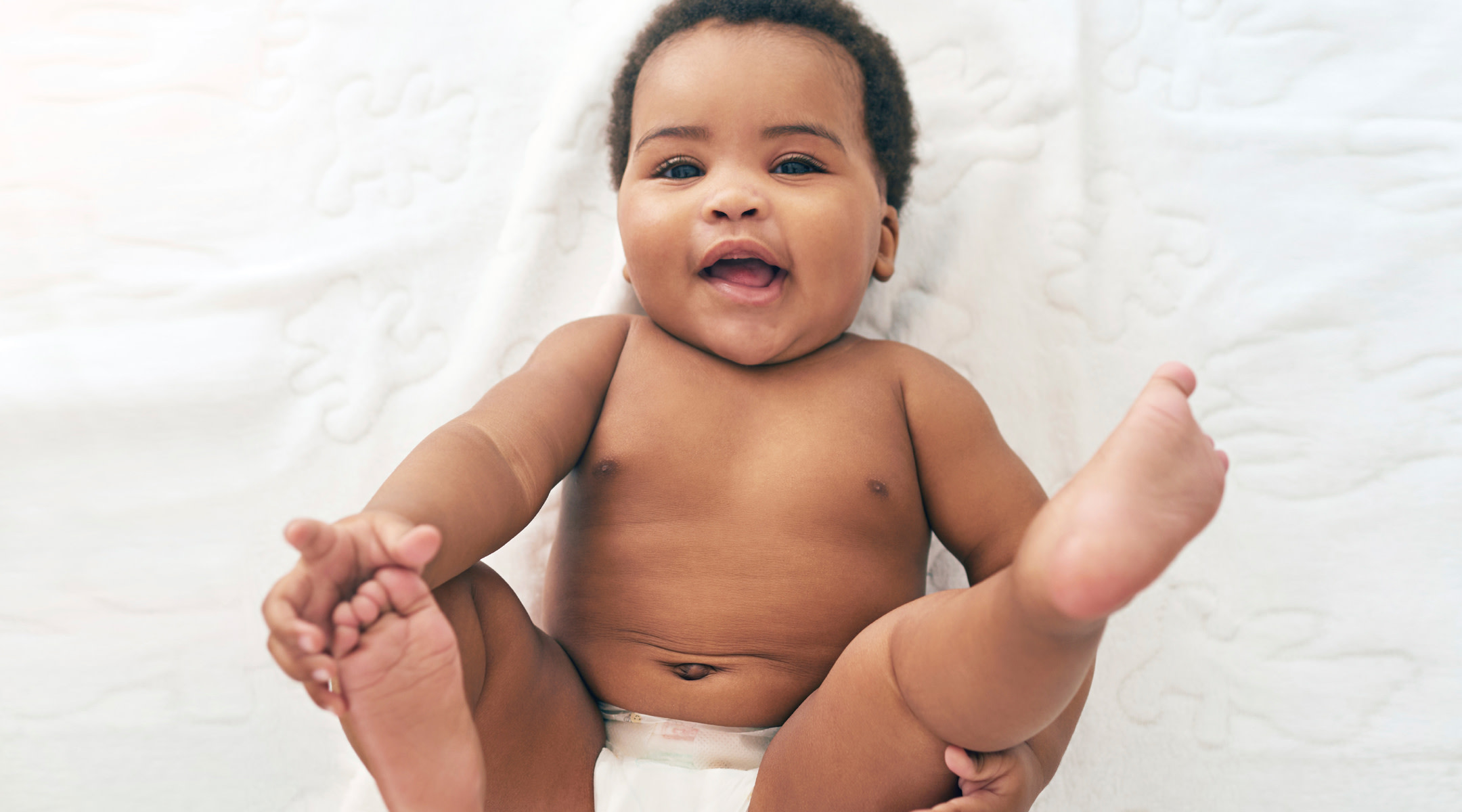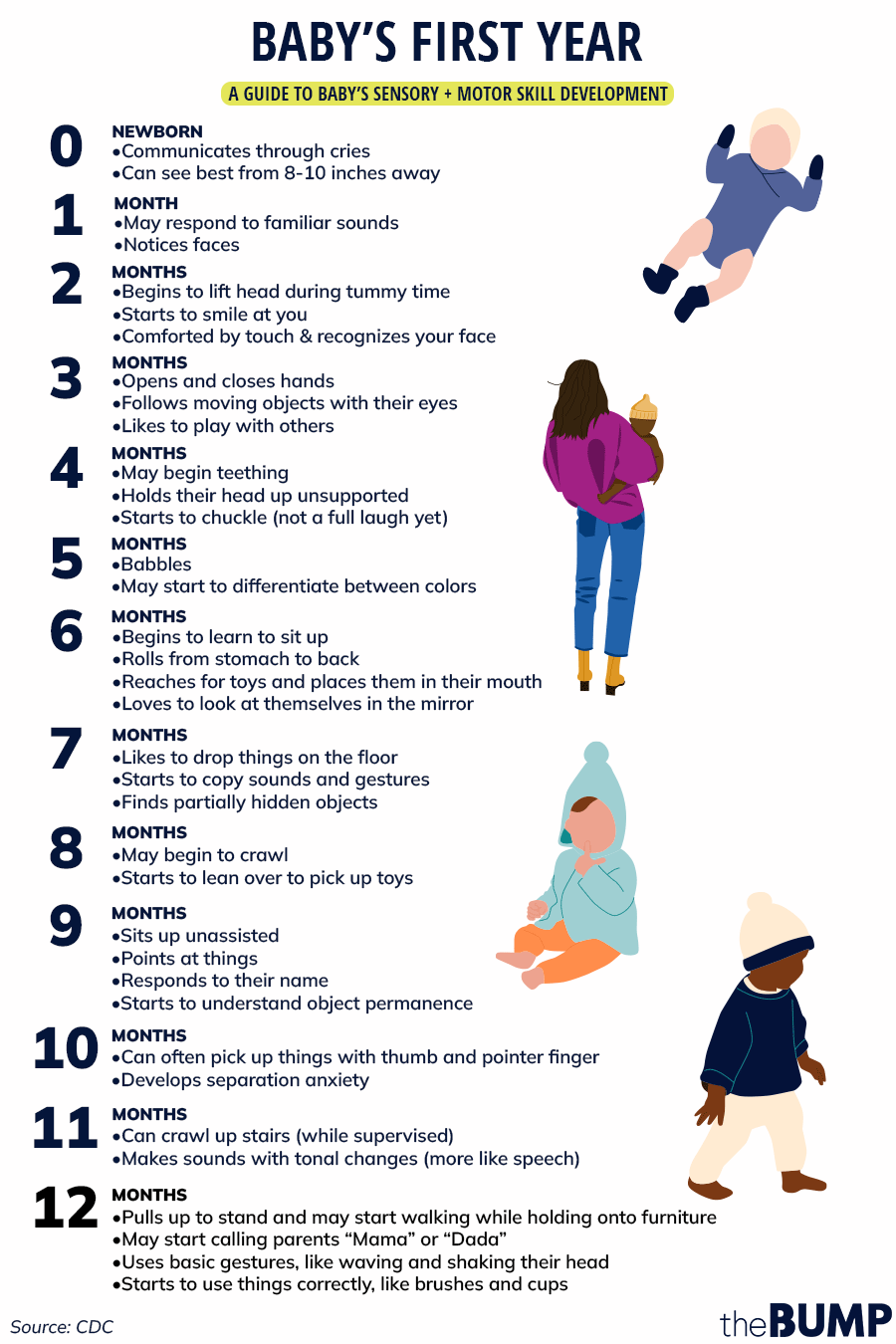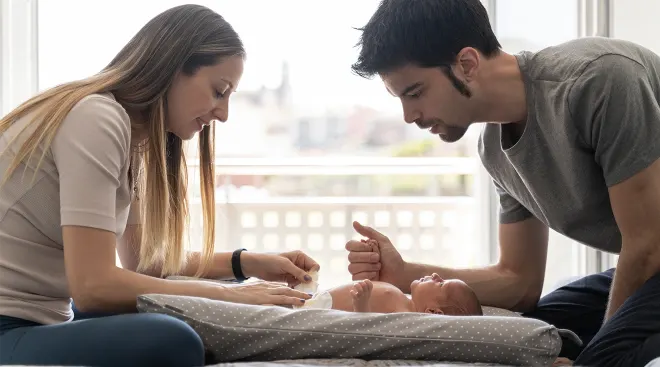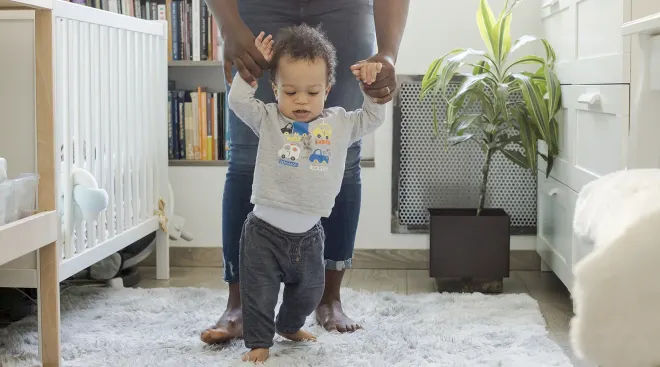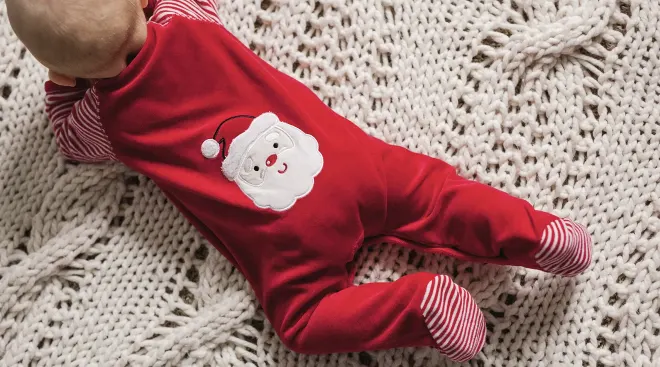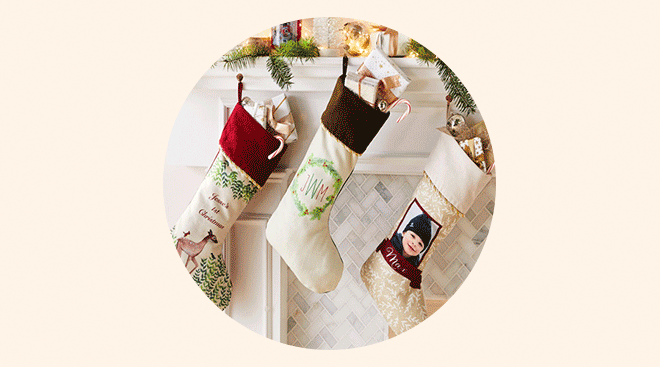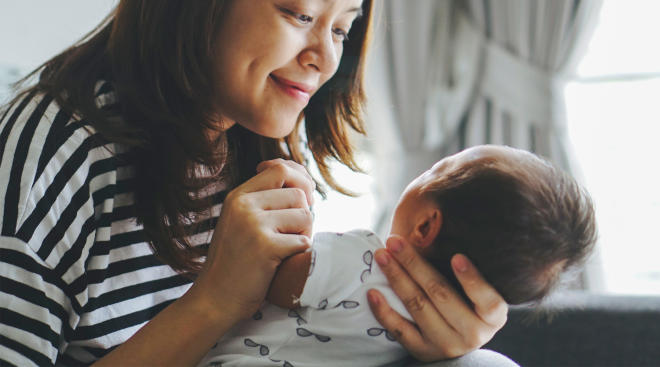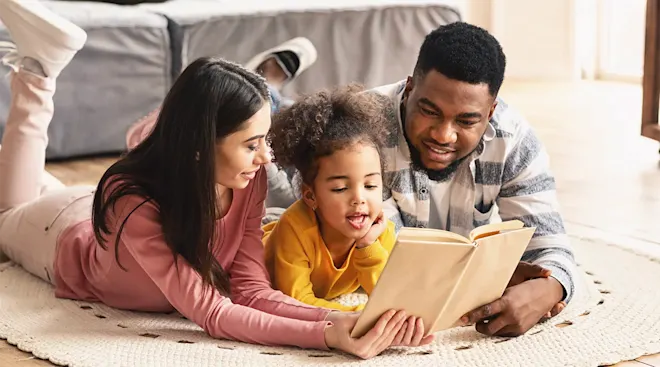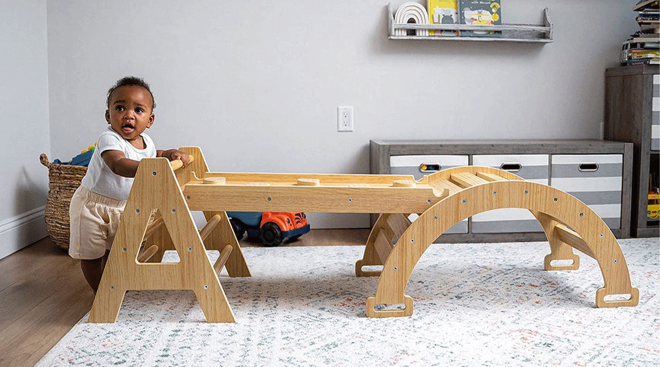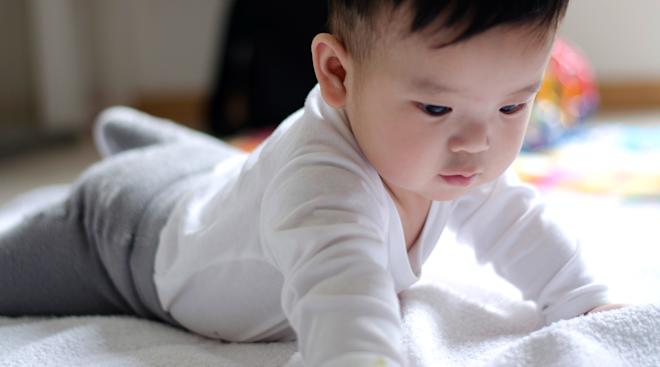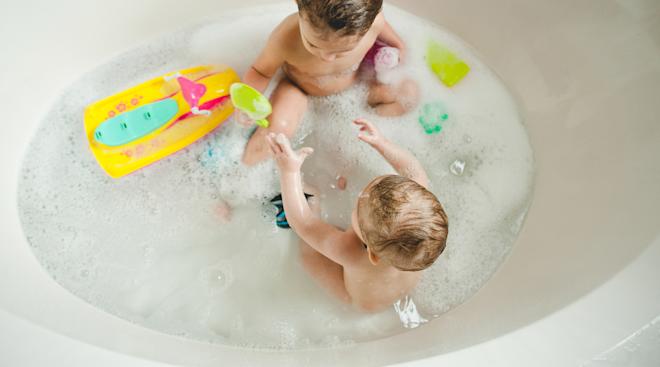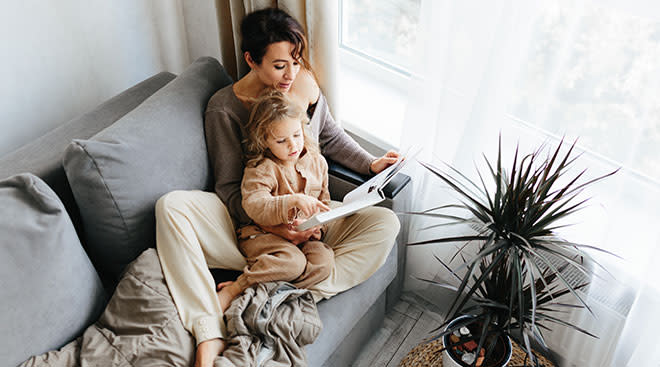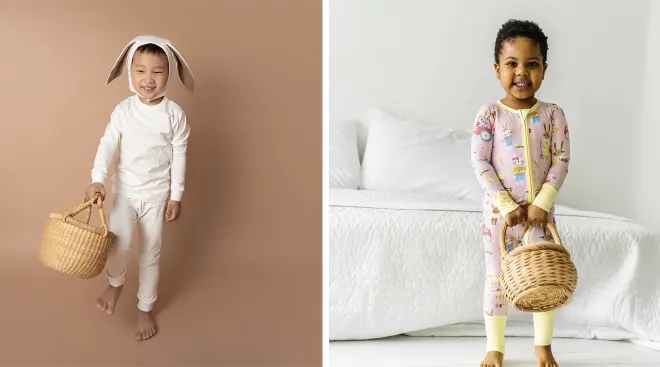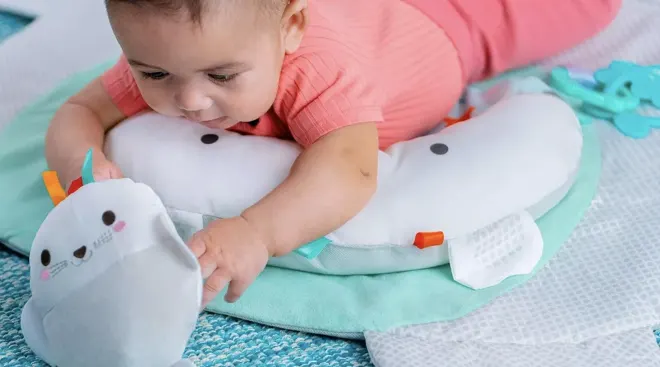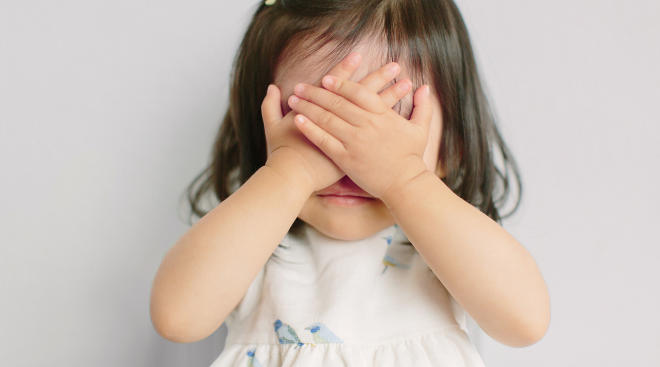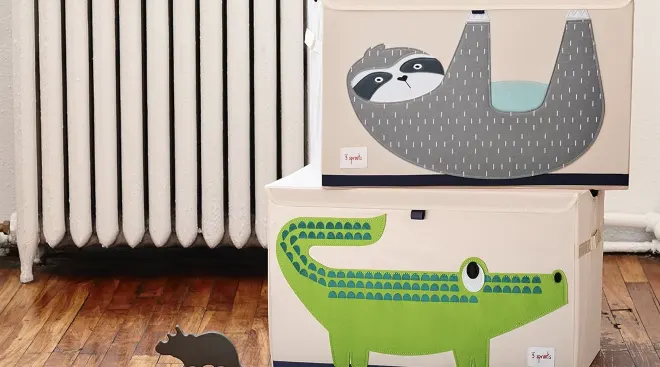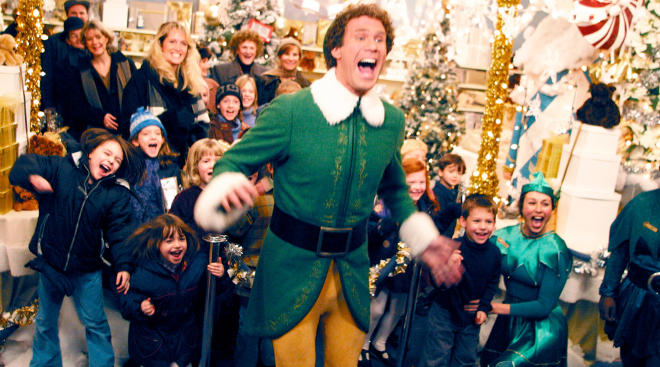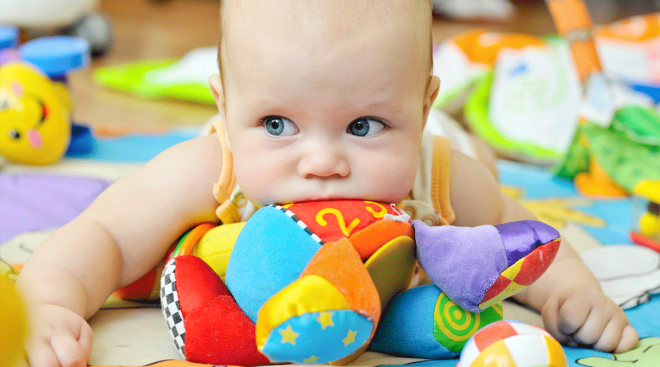Baby Milestones: What Baby Will Do When
Watching baby grow and gain new skills is incredibly thrilling—and it happens fast. That first year is packed with moments when your infant masters a tricky movement and reaches exciting baby milestones. They actually smiled! They clapped their hands! They pulled themselves up!
Can’t wait, right? So when will baby be able to do what? Every child hits baby milestones at their own pace—so don’t worry if yours doesn’t follow this guide to a tee—and there’s a big age range for when little ones meet these milestones. To help make this clearer, the Centers for Disease Control and Prevention (CDC) and the American Academy of Pediatrics (AAP) adjusted their milestones guidance in February 2022 to include expanded age ranges and more specific language to help parents better understand when and how child development unfolds.
Still, don’t hesitate to bring any concerns about baby’s progress to your pediatrician. “If it’s just one milestone that your child is a little behind on, you can mention it to your pediatrician, but chances are, everything is probably fine,” says Tanya R. Altmann, MD, author of Mommy Calls. “However, if your child isn’t hitting multiple milestones across the board—not smiling and not rolling over, for example—then I’d be a little more concerned.” Keep in mind, there are instances when it may take a little longer for baby to reach their milestones—such as if baby was born prematurely. If that’s the case, your doctor can help you adjust expectations accordingly.
The COVID-19 pandemic also seems to be having an impact on milestone timelines. Alexis Phillips-Walker, DO, a pediatrician at Memorial Hermann Medical Group Pediatrics in Atascocita, Texas, says she’s noticed delays in speech and emotional development in particular due to social distancing and limited interaction with people outside the home. She hopes the new CDC milestones will help facilitate early intervention when needed. Most children—about 75 percent—reach milestones by the age outlined in the CDC’s revised checklist, so “it will be easier to determine if a child has delays,” she explains.
To see all the first-year baby milestones in one place, check out our master baby milestones chart. But for the biggest baby milestones of the bunch, including when they’ll happen and how to help baby get there, keep reading.
When to expect it: Baby should be smiling back at their parents around 2 months of age. You might notice baby smile in their sleep at first, but then they’ll start to smile back at you when they’re awake and alert, which makes playtime all the more fun.
How to encourage it: You’re probably already doing it: Talk to baby and throw plenty of smiles their way. “Smiling is really one of those first baby milestones I’m looking for as a pediatrician,” says Altmann. “If baby isn’t smiling back at the parent by 2 months of age, I want to keep a close eye on them. Sometimes it will happen by 3 months, but if not, that’s when I’ll get concerned about possible neurological issues.”
When to expect it: Some infants start to roll early, but it’s more likely to occur around 4 to 6 months, Altmann says. “Initially, they’ll probably roll from front to back, and then they’ll master rolling back to front. Very often, baby will get stuck and may get upset and cry.” Even before baby has the whole rolling thing down pat, though, never leave them alone on an elevated surface—babies start wriggling around pretty early on and can fall.
How to encourage it: Get down on the ground and talk to baby, cheering them on. Hold blocks or toys just out of reach so they can flip over trying to reach them. If baby isn’t trying to roll over by 6 months of age, let your pediatrician know. Most likely, Altmann says, baby just needs more time to hit this baby milestone. But if they’re not making any effort, that could be a sign something else is going on.
When to expect it: Generally, after 4 months of age, baby should be able to sleep at least six to eight hours straight without feeding, Altmann says. And by 6 months, they should be able to go at least 8 to 10 hours without a feeding. Of course, every child is different, and there may be bouts of sleep regression to contend with along the way.
How to encourage it: Let baby sleep! Slowly start extending the time between nighttime feedings until you get there. And don’t rush to pick up baby the moment they cry at night. They need to learn that if they wake in the night, they don’t need you to help them fall back asleep again. If they’re not sleeping through the night by 6 to 8 months, it might just be because you’re checking on them too often at night, Altmann says, and you may want to consider backing off. Still, you may want to mention it to your pediatrician—if baby keeps crying and can’t fall asleep, that can be a sign of gastroesophageal reflux (GERD).
When to expect it: Altmann estimates that about 50 percent of babies can sit—but probably pretty wobbly or propped up—at 6 months. By 9 months, they should be able to sit comfortably and more steadily on their own.
How to encourage it: As with all baby milestones that center around motor skills, your child needs an opportunity to learn, so be sure you’re giving them plenty of free time on the floor. If you’re always wearing baby, carrying them or strapping them in a swing or chair, it may take them longer to learn to sit up, pull up to stand and walk. If baby isn’t sitting on their own by 9 months, your pediatrician may suggest they be evaluated by a physical therapist.
When to expect it: Generally, babies start making sounds (other than crying) at 2 months, cooing and chuckling by 4 months and making some consonant sounds at 6 months. But every baby is different. “Between 6 months and one year of age, some babies start developing words, and some don’t,” says Dyan Hes, MD, medical director of Gramercy Pediatrics in New York City. “Some babies at 9 months might say ‘dada’ or ‘mama,’ because we say it to them. But it’s nonspecific—they’ll just say dada for everything.” (Dada is actually an easier sound to say, so mama often comes later.) By one year, babies should have at least one word that’s specific, like “hi,” “bye,” “up,” or “go.” Between 16 months and 18 months, Hes says, kids should have four to five words in their vocabulary. As for when baby’s words will actually be comprehensible? The rule of thumb is this: By 2 years, 50 percent of your child’s speech should be intelligible. That goes up to 75 percent at 3 years of age, and at 4 years old, all speech should be understandable.
How to encourage it: Talk to baby. “Whatever you’re doing, you should just say that word and point to the object. ‘Shoe.’ ‘Fork.’ ‘Spoon.’ Whatever it is, you can’t talk to your kids too much,” Hes says. “You’d be surprised how many parents don’t talk to their kids.” Reading books and listening to music in which words are sung are also great ways to help baby along. If by 18 months your child still isn’t speaking, bring it to your pediatrician’s attention. “Any time there’s a speech delay, the first thing you do is get your child a hearing evaluation, because that’s the most common thing—that they’re not hearing well,” Hes says. “If the child does hear well, then we’ll likely start speech therapy.”
When to expect it: It could be as early as 6 months, when baby sits up on their own, but clapping is more likely to start closer to 8 or 9 months, Altmann says—and it may take a few more months for baby to master it. According to the CDC, it may take as long as 15 months for a child to master clapping.
How to encourage it: Play patty-cake and other clapping games with baby. Your own clapping gets baby so excited, they’ll start to bring their hands together in an effort to clap along with you. If by the one-year pediatrician’s visit baby isn’t mimicking any of your actions—whether it’s clapping, waving or responding to you when you call to them—let baby’s doctor know.
When to expect it: “At 6 months of age, babies can bring both hands to their midline. So if you were to hold a toy in front of them, they would bring both hands up and try to grab it,” Altmann says. But it’s not until about 8 or 9 months (at the earliest) that they use a pincer grasp, using their thumb and forefinger. “This is when they can pick up small objects and bring them to their mouth—and often when parents start finger foods,” Altmann says. “You also have to be careful, because that’s when they bring other small objects up to their mouth as well.”
How to encourage it: To help those motor development baby milestones along, offer baby safe objects—colorful or noisy toys work well—to grab and jiggle. If baby isn’t picking up small pieces of food and feeding themselves by 12 months—one of the food-related baby milestones—let your pediatrician know.
When to expect it: Around 9 months, babies usually start waving—but some start as early as 7 or 8 months, Hes says.
How to encourage it: To help baby learn to wave, you’ll have to demonstrate how to do it. “There’s no way they’ll do it on their own,” Hes says. “Once you show them, then they get excited about it and start doing it themselves.” If baby doesn’t wave at 9 months, it’s not a huge red flag, unless it’s in conjunction with other delays. According to the CDC, most babies wave by 12 months. “If at 9 months a baby also isn’t picking up little pieces of food and feeding themselves, or if baby isn’t holding their bottle, that could be a sign of low motor skills,” Hes says. Your pediatrician might recommend physical therapy to strengthen them.
When to expect it: Though most infants will pull themselves up to a standing position between 9 and 12 months, Altmann says it’s not unusual for it to happen even earlier—like 8 months. “I warn parents at the six-month visit to drop the mattress down [in case] your infant pulls to stand in the middle of the night when you’re not aware that they can,” she says. “You don’t want them to fall out!” You’ll also want to be aware of any furniture that baby could try to pull on that could tumble, like a top-heavy chair or an entertainment center.
How to encourage it: As with sitting, make sure baby gets lots of free-range playtime. If they’re not pulling to stand by their first birthday, let your pediatrician know. “It doesn’t mean that there’s something wrong with them, because they could be almost there,” Altmann says. “But I think it’s a good idea to check in with the doctor to make sure there’s nothing else going on.”
When to expect it: After they learn to pull themselves to stand, at around 9 to 12 months babies start to cruise—aka teaching themselves to walk by holding onto furniture. “When they initially pull to stand, they’ll grab on, let go and drop down on their bottoms. But then they’ll figure out that they can hold on and walk along the couch,” Altmann says. “Within a couple weeks to a couple months, they’ll let go and take their first step.” She says to expect those initial steps around the one-year mark, but for some kids, it may not be until 15 months or even later.
How to encourage it: One of the most anticipated baby milestones, walking can be encouraged with more floor play! If baby doesn’t hit the milestone in the expected timeframe, there’s probably nothing to be worried about, unless baby’s missing other baby milestones as well. But it’s worth a mention to your child’s doctor and maybe an evaluation by a physical therapist.
As with any milestone, keep in mind that these age ranges are simply a general guide; all children will move at their own pace. If you’re concerned about baby’s progress and development, it’s best to reach out to your pediatrician—if there is a problem, early intervention can be incredibly valuable. Together with your doctor, you can come up with a set of steps and plans to help baby’s growth and development.
Please note: The Bump and the materials and information it contains are not intended to, and do not constitute, medical or other health advice or diagnosis and should not be used as such. You should always consult with a qualified physician or health professional about your specific circumstances.
Tanya Altmann, MD, is a pediatrician and founder of Calabasas Pediatrics, as well as a bestselling author and spokesperson for the American Academy of Pediatrics. She completed her residency at UCLA and received her medical degree from Sackler School of Medicine in New York City. She currently also serves as an assistant clinical professor at UCLA Mattel Children’s Hospital.
Dyan Hes, MD, is the founder and medical director of Gramercy Pediatrics in New York City with over 20 years of experience. She currently also serves as a clinical assistant professor of Pediatrics at the Weill Medical College of Cornell University and at NYU Grossman School of Medicine. She received her medical degree from Sackler School of Medicine in New York City and completed her residency at Albert Einstein College of Medicine.
Alexis Phillips-Walker, DO, is a pediatrician with Memorial Hermann Medical Group Pediatrics Atascocita in Atascocita, Texas. She earned her medical degree at Ohio University College of Osteopathic Medicine in Athens.
American Academy of Pediatrics (AAP), Evidence-Informed Milestones for Developmental Surveillance Tools, February 2022
Learn how we ensure the accuracy of our content through our editorial and medical review process.
Navigate forward to interact with the calendar and select a date. Press the question mark key to get the keyboard shortcuts for changing dates.
































